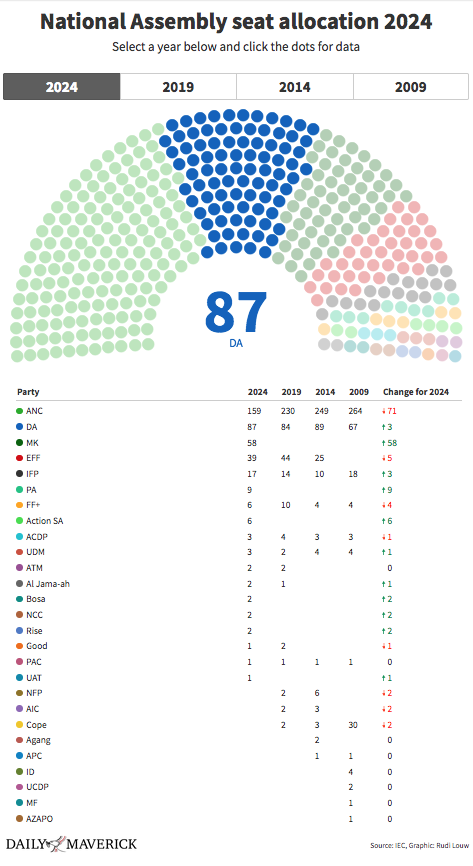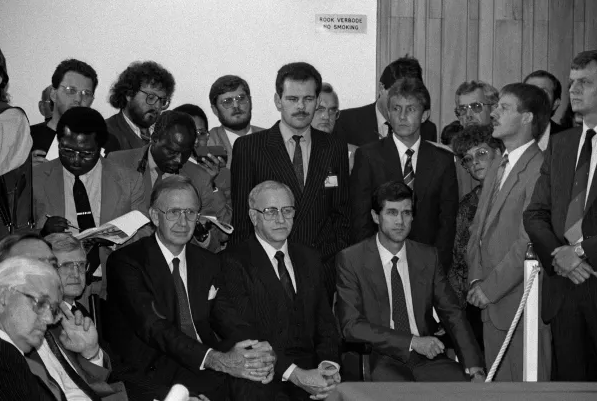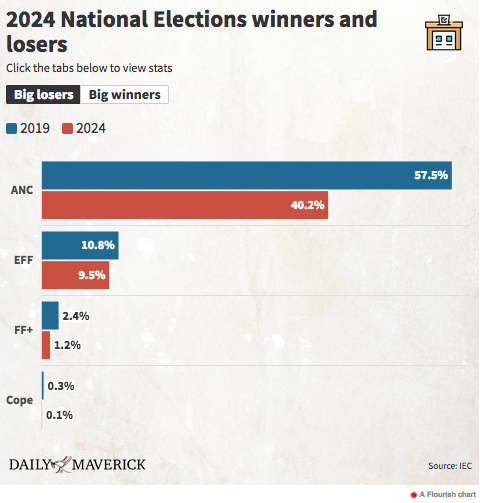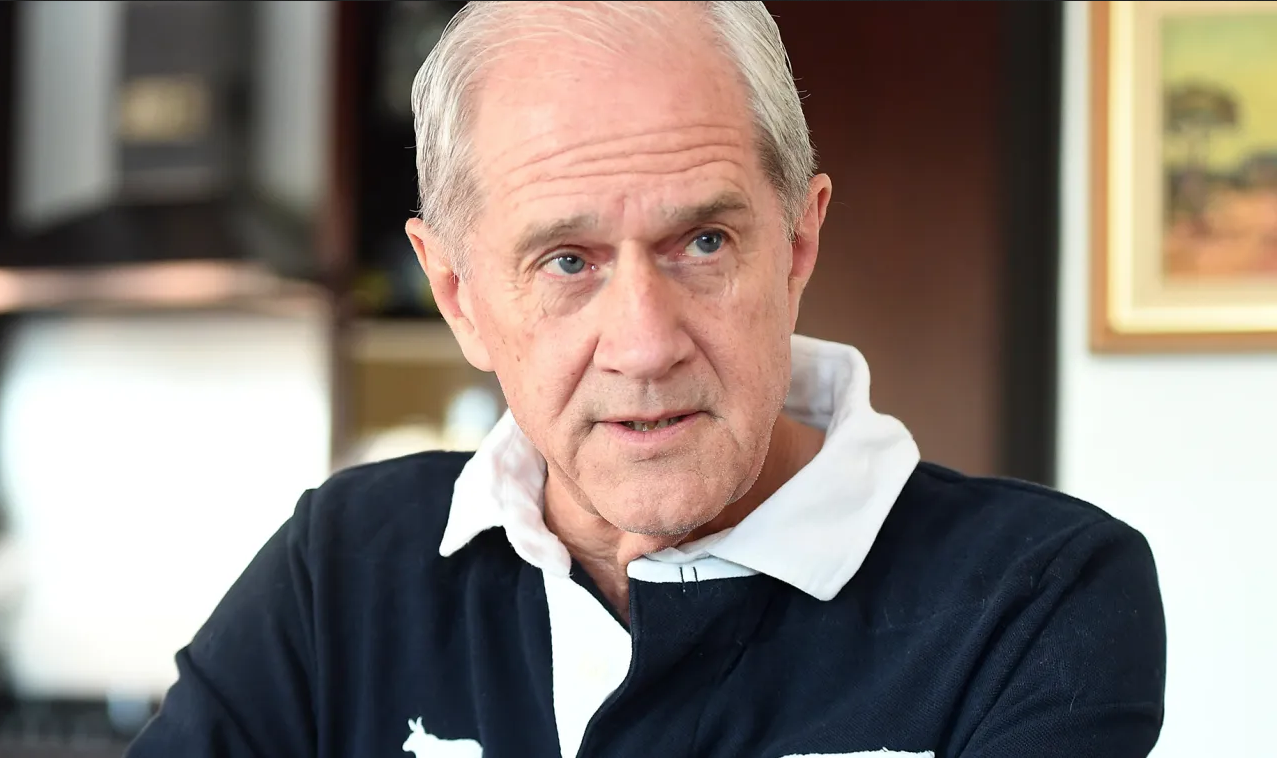The man who negotiated South Africa’s first transition from apartheid to democracy with President Cyril Ramaphosa explains what makes a good set of talks.
When South Africa stood at a cusp similar to the one we now face, then Minister Roelf Meyer, with now President Cyril Ramaphosa, headed negotiations to put the country on a path to peace. Ferial Haffajee asked Meyer what good talks look like as South Africa begins an intense and short period to negotiate power sharing.
Question: How do you build rapport and relationships across canyons of mistrust and positions so widely different they feel difficult to breach?
Answer: The one benefit is the Constitution, a distinguishing feature. In the early Nineties, we had no commonality about the content of a future Constitution. Today, we have that starting point. We know those that support (the Constitution) and those that don’t. That is a clear line as a starting point. That is in the leaders’ minds, as (former president) Kgalema Motlanthe said at the weekend.
The Constitution is based on the founding principles, which are found in Chapter 1. This chapter states that the Constitution is the supreme law of the land and that we are one people in one land. Chapter 2 provides the binding factors, which are provided in the Bill of Rights.
Question: But what happens when you have a party, like MK, whose manifesto says one of its first steps as a (potential) government is to hold a referendum to scrap the Constitution?
Answer: These guys want to take us back into the dark ages. They want to scrap the Constitution and make Parliament the sovereign.
In apartheid times we didn’t have a Constitution and a Bill of Rights. (The Manifesto) risks a repeat of an order that reminds one of apartheid times. When the autocratic leadership of the day could decide what to do with the people of the country. It seems MK wants to replicate that order.
Question: Are there huge gaps among parties even when they support the Constitution? How do they communicate their differences, which often seem intractable?
Answer: You seek agreement on the bigger issues and in the national interest. It’s easier to find agreement at the higher level. When you go down through the layers, you find various layers that are more difficult to agree on. The issues of land, education, the NHI, etc, are things that provide contemporary differences.

You need to start with the subjects and values you can find agreement on. And work from there to tackle the differences one by one. There are those you can’t find agreement on, and (you need to) find a model for addressing differences. In the case of the government of national unity (GNU – South Africa’s first democratic-era government, which included the National Party and Inkatha), you had mechanisms on how to address it. These often included discussions between party leaders and ministers.
One person who comes to mind is Jakes Gerwel – DG (director-general) in Madiba’s presidency. He could really bring people together. When people had problems, we often rushed to Jakes. He was very solution-oriented. That was one of the reasons Madiba chose him to be close to him. It was his natural attitude – he thought people were important and brought them together. That is the key, actually. You have to accept that you must put aside egos.

Question: How easy was it to find each other in those days?
Answer: The alternative was too ghastly to contemplate. We were more inclined to seek the answers to find solutions than to disrupt. We find ourselves in a similar situation today. Of course, it’s completely different in terms of background and history before the transition (in 1994). I’m not trying to replicate the two situations. (But it’s similar in that) we have a new administration coming into place after 30 years. We have to accept the election results and deal with the consequences. The previous six administrations were based on a departure point in which we had a clear ruling party. We have a new transition to make to a new administration in what will come up in the seventh administration. It’s new ground to address. Some things will stay the same. The most important thing will. There is no ruling party any longer. A new ruling order has to be built.
Question: It is but a little scary to contemplate.
Answer: That is how it was in 1994.
Question: How did you find common ground?
Answer: We had a bit of time. At the end of 1992, we started to think about the government of national unity. So, we had about 18 months. This was ample time to prepare, work through it, and formulate the interim Constitution. We had time on our side then, and the outcome in 1994 was the formation of a GNU (government of national unity) – ANC, NP and IFP. Then, we could start to look at the implementation. Now the situation is more difficult. These guys have less than two weeks to figure things out. It’s a pity they didn’t start thinking about it before.
Question: In 1994, there was a lot of bonhomie (among leaders) and goodwill. Do we have that this time around?
Answer: There has been goodwill from the leaders’ pronouncements since Saturday (1 June). From Cyril (Ramaphosa). (IFP leader Velenkosini) Hlabisa. (DA leader John) Steenhuisen. Even EFF leader (Julius Malema). There is an understanding of the responsibility under which they have to operate. That brings cool minds. As long as they accept responsibility, that is good. At that time (the Nineties), every time there was a blockage or a breakdown, we looked each other in the eye and said we had to find a way forward. It’s something of the same now.

Question: What kind of countervailing institutions and commitments do we need to help our country through this moment?
Answer: We must respect how the IEC handled a potentially contested situation on Saturday evening (when MK leader Jacob Zuma threatened the IEC and said the final result should not be released). That was a firm direction the IEC gave. They did the same in the build-up to the election already. (To lead with independence and not allow the election timetable to be derailed.)
What they did on Saturday evening and Sunday was a solid way of showing the direction. (The IEC went ahead with the final results announcement, as reported here.) That enabled the leaders to step up. We have the Constitutional Court. In 1994, the Constitutional Court had just been instituted after the transition. We had an electoral court that helped us through the election period. We didn’t have a Constitutional Court. Now we know if things are getting into trouble, we have access to the court.
Question: How do you even start these talks in a negotiating room?
Answer: The bottom line is that these guys (men and women in the negotiating teams) know each other, which is good. They know the good and bad. We still had to find common ground when we started the process in 1991 or 1992. They have the advantage of knowing each other for many years. Some will concentrate on shortcomings, and some will work on the good things. In many instances in my experience and in conflict situations, so much depends on relationships. If people are able to expose themselves to human behaviour and just be decent.
Question: That depends on how you see human nature – do we see the worst or the best? Negotiating to share power is a high-octane game.
Answer: It’s about power but also about aspiration. I was watching (tennis player Novak) Djokovic yesterday (3 June). At one stage, he lost it and really misbehaved in the court. Djokovic is an experienced, mature tennis player who can even lose it. One must expect that in the negotiating room. There will be hot air and warm minds. You have to make sure they stay on track.
Not everybody can be a leader. There were so many occasions where things would have derailed if not for Cyril and me. It depends on leaders bringing calm. You must know when to break up and come back the next morning.
Question: What was your secret sauce?
Answer: It’s a matter of realising the responsibility. We didn’t have mediators; it was just us. We built a relationship. We could leave the room filled with anger, and it was back to us the following day. They have 12 days left as we speak. Do not try to look for what will cause a breakdown; look for the bonding of a deal for the next five years. That is what the people of SA expect of them. We want to avoid instability next month.
Question: What was the message of the people in our election results?
Answer: Everyone has his or her own analysis of the situation. Most people were surprised by the extent of MK’s growth, which was the main factor that diminished the ANC vote. There isn’t any leader who can say the voters have been totally satisfied with them. I say that because every leader there has to take the responsibility to exercise maximum respect for the voters of the country in what they do over the next 12 days. No one can cry victory. If they think so, that party would have been the majority. No party has more than 40%, so there is unhappiness with all the parties to some extent.
Question: We have a populist surge in SA. How will that impact talks?
Answer: It goes back to what I said at the beginning. The Constitution should undermine populist tendencies. We should respect the Constitution and use it to set out values and principles.
I have just come back from a conference in Sarajevo. It was a conference of civil society leaders from the MENA (Middle East, north Africa) region. It was so interesting and insightful. In every case, it was about how to change the autocratic state of affairs and that comes from populism. I returned feeling that “South Africa is a good place to be”.
Stay informed with The Namibian – your source for credible journalism. Get in-depth reporting and opinions for
only N$85 a month. Invest in journalism, invest in democracy –
Subscribe Now!






